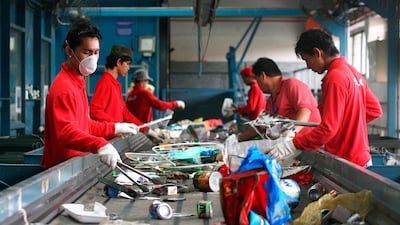It is the futuristic city state where two-thirds of waste is recycled, waste-to-energy plants power services and a manageable amount is dumped in the crowded city's single landfill site.
Now the cities of the UAE could soon be following that model with the news that Emirati officials will be working with their counterparts there on a joint-plan of action to tackle environmental challenges.
Samuel Tan, the Singaporean ambassador to the UAE, said the threats posed by climate change, environmental problems and water management would be tackled in a series of joint projects.
Dubai and Abu Dhabi have ambitious plans to cut the amount of waste that goes to landfill, with the opening of new facilities to better treat waste. But in Dubai, for example, about 75 per cent of waste currently goes to landfill.
In contrast, Singapore sent about 40 per cent of waste to landfill, recycling the remainder.
“This will entail expert visits between both countries and both sides are working on a joint action plan,” said Mr tan.
“A number of study visits have taken place in Singapore looking at how do you recycle waste – for us that’s always been something which we’re very much focused on because being a very small island, you cannot afford to have large amounts of waste which will consume a lot of land.
"So the recycling of waste is a very critical part of maintaining a sustainable environment for Singapore, not only recycling but converting it into something useful like energy.”
According to its National Environment Agency (NEA), Singapore aims to become a zero-waste nation by reducing its consumption as well as reusing and recycling all materials to give them a second lease of life.
It burns a lot of it for energy through its waste-to-energy plants and sends very little to landfills. Waste sorting and recycling is also made available in residential buildings as well as collection for schools, malls and offices. Recyclables are sorted into different waste streams, baled and sent to local and overseas recycling plants.
Nestle Singapore and the Nanyang Polytechnic School of Information developed an eco-friendly app called 123Recycle to help citizens recycle waste packaging correctly. Supported by the NEA, users scan a barcode on the product to get instructions on how best to dispose or recycle different parts of the packaging.
“These are some of the things the UAE is interesting in doing some work [in],” Mr Tan said. “For us, also maintaining a good and clean environment when it comes to air quality is important. So you need to have very stringent emissions control when it comes to pollutants, you also need to make sure your vehicle emissions are controlled at acceptable levels and I see a lot of emphasis here on electric cars and it’s something we’re trying to do too. These are areas both sides are sharing experiences on.”
Two years ago, the UAE and Singapore joined hands on developing “smart-city” capabilities whereby Masdar City and the Ministry of Energy were interested in Singapore’s energy-efficiency solutions. Conversely, the Asian country was interested in learning from the UAE about environmentally-friendly buildings.
“The UAE is definitely playing a leading role in this, especially in the Gulf where water and electricity needs to be adequately managed,” said Dr Saif Al Ghais, head of the environment authority in Ras Al Khaimah. “This is the country’s contribution to the international trend towards reducing carbon emissions and therefore global warming so it’s a commitment.”
He said recycling waste, reducing the consumption of fossil fuels, increasing green areas and mass transportation, are some of the areas in which the UAE has been doubling its efforts. “It’s also about educating people in reducing their water and electricity use,” Dr Ghais said. “This will all help in reducing global warming in the long run.”
Others said the UAE was keen to learn new practices from other countries which have expertise in the field.
Recycling waste, controlling carbon emissions and managing water and energy are all a vital part of tackling climate change and addressing global warming,” said Dr Karim Bergaoui, climate and water modelling scientist at the International Centre for Biosaline Agriculture in Dubai.
“If we don’t take any action, the cost of the adaptation in the future will be much higher than the cost of the mitigation now. The number of consecutive dry days will increase with an increase in temperature that will impact food security and the amount of water needed for irrigation.”
cmalek@thenational.ae

